
Abstract
This paper discusses the strategic management of the Indonesian diaspora, focusing on optimizing their talents for national advancement. The Indonesian diaspora, numbering at least 9 million, holds significant potential to contribute to various strategic sectors, such as sports and STEM. The success of the Ministry of Youth and Sports of the Republic of Indonesia (Kemenpora RI) in identifying and utilizing diaspora athletes serves as a concrete example of how this strategic approach can be applied more broadly. This paper covers strategic management, including environmental analysis, strategy formulation, implementation, control, and evaluation. Recommendations include establishing a Presidential Special Task Force for Diaspora Affairs to coordinate policies, develop a dynamic database, and facilitate knowledge transfer. Through this approach, the Indonesian diaspora can continue to be a valuable asset and contribute significantly to national development and the realization of the Vision of Indonesia Emas 2045.
Keywords: strategic management, Indonesian diaspora, sports, STEM.
Introduction
Etymologically, the word “diaspora” originates from the Greek “diaspeirein,” meaning “to scatter” or “to disperse” (Diaspora | Search Online Etymology Dictionary, n.d.). Initially, the term carried a pejorative connotation, describing the forced dispersal of ethnic communities or groups from their homeland, such as the Jewish and Armenian diasporas. However, the term has since evolved to encompass voluntary migration in search of economic, educational, or personal opportunities. Examples include the Indian and Chinese diasporas, whose members migrate for study, work, and trade. Thus, diaspora can be understood as the spread of an ethnic community or group from their homeland to various parts of the world, whether by force or choice.
According to the World Migration Report 2024, at least 281 million people worldwide live outside their birthplace (The International Organization for Migration, 2024). This number is comparable to Indonesia’s population, which reached 280 million as of December 2023 (Fadhlurrahman, 2024). Imagine the entire population of Indonesia living abroad—that’s roughly the scale of global migration and diaspora. Furthermore, 281 million people represent 3.6% of the world’s population. Simply put, out of every 100 people in the world, three to four are part of a diaspora.
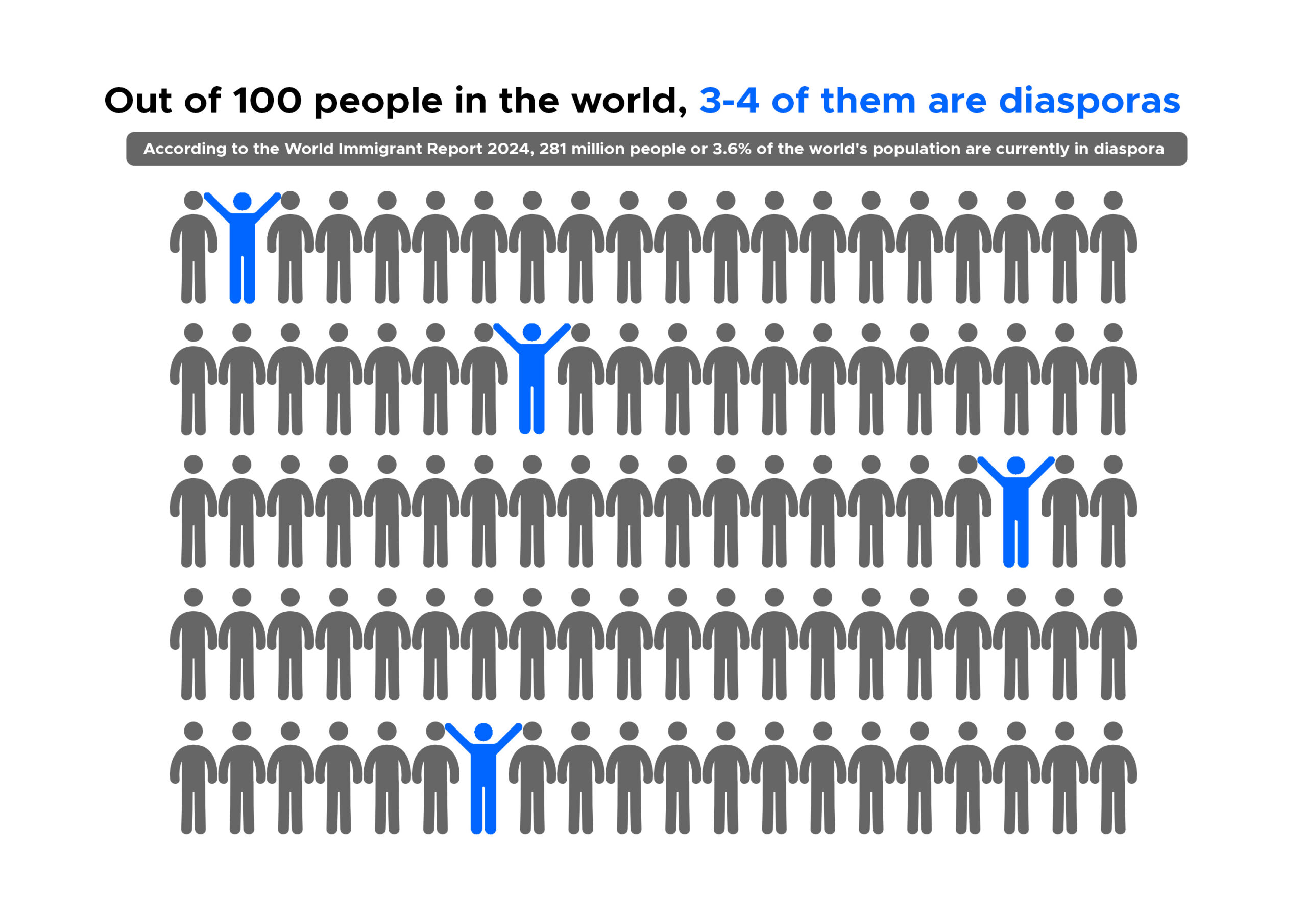
The report also explains that the reasons for diaspora include voluntary desires to study, work, economic drives, and other factors. However, there is a growing trend of people moving to other countries due to conflict, as seen in Ukraine, Gaza, Syria, and Yemen. Others are forced to move due to ecological damage, as experienced by the diasporas of Pakistan, the Philippines, and Bangladesh.
The global diaspora continues to play a significant role in human development and economic growth. The same report details how total international remittances from the diaspora reached $831 billion in 2022. For comparison, global diaspora remittances are higher than Switzerland’s GDP—one of the world’s wealthiest countries—with a GDP of $818 billion (World Bank Group, n.d.). Further analysis reveals that the amount of international remittances has increased by more than 650% since 2000. Interestingly, this increase has remained stable despite detrimental factors like the COVID-19 pandemic, which slowed global economic growth in recent years.
Of the total remittances amounting to $831 billion, $647 billion (about 78%) were sent by the diaspora to low- and middle-income countries. Thus, remittances become an economic driver and hold a significant role in these countries’ GDP. In some countries, such as India and the Philippines, remittances even exceed foreign direct investment (FDI) (World Bank Group, n.d.).
As a community abroad, the diaspora can maintain national identity while introducing it to other nations—people-to-people diplomacy. This extends beyond language, culture, and cuisine to public diplomacy. Diaspora communities often advocate for their homeland’s interests abroad, acting as unofficial diplomats. An example is the advocacy of the Palestinian diaspora in Sweden. With a significant Palestinian diaspora, Sweden became the first Western European EU member to recognize Palestine in 2014 (“Which countries”, 2024). The Palestinian diaspora’s advocacy provides a tangible example of how diaspora can act as diplomatic agents, voicing the interests of the Palestinian people and nation (Lindholm, 2021).
A strong diaspora community, supported by financial strength and direct access to power, can become a strategic asset for a country. The Israeli diaspora’s lobbying in the United States (US) is one of the most successful examples of influencing US foreign policy to be more pro-Israel (Mearsheimer and Walt, 2007; Obama, 2020). The success of diaspora lobbying in shaping a country’s policy illustrates how diaspora can become a strategic asset for their homeland, with significant impacts on international politics and bilateral relations.
Indonesian Diaspora
According to the Indonesian Diaspora Congress and Presidential Regulation (PERPRES) Number 76 of 2017, the Indonesian diaspora comprises Indonesians living abroad. This includes Indonesian citizens (WNI), former WNI, and descendants of WNI and/or former WNI.
Historically, the Indonesian diaspora is not a new phenomenon. Before independence, Indonesian diasporas in the Netherlands advocated for Indonesia’s independence across Europe. Many of them, such as Bung Hatta and Sutan Sjahrir, eventually returned home and played central roles in achieving independence (Hatta, 2019). Furthermore, after independence, the diaspora in Egypt, including Zein Hassan and his colleagues, assisted Haji Agus Salim’s delegation in securing Egypt’s first recognition of Indonesian independence. In the preface to Diplomasi Revolusi Indonesia di Luar Negeri, Bung Hatta acknowledges and praises how the young Indonesian diaspora’s movement “smoothed the way” for Indonesian diplomats to gain recognition in the Middle East (Hassan, 1980).
Today, the Indonesian diaspora is spread across at least 92 countries (KPU, n.d.). According to World Bank data, the Indonesian diaspora numbered approximately nine million in 2019 (The World Bank Office Jakarta, 2017), equivalent to the population of South Sulawesi, the seventh most populous province in Indonesia (Fadhlurrahman, 2024).
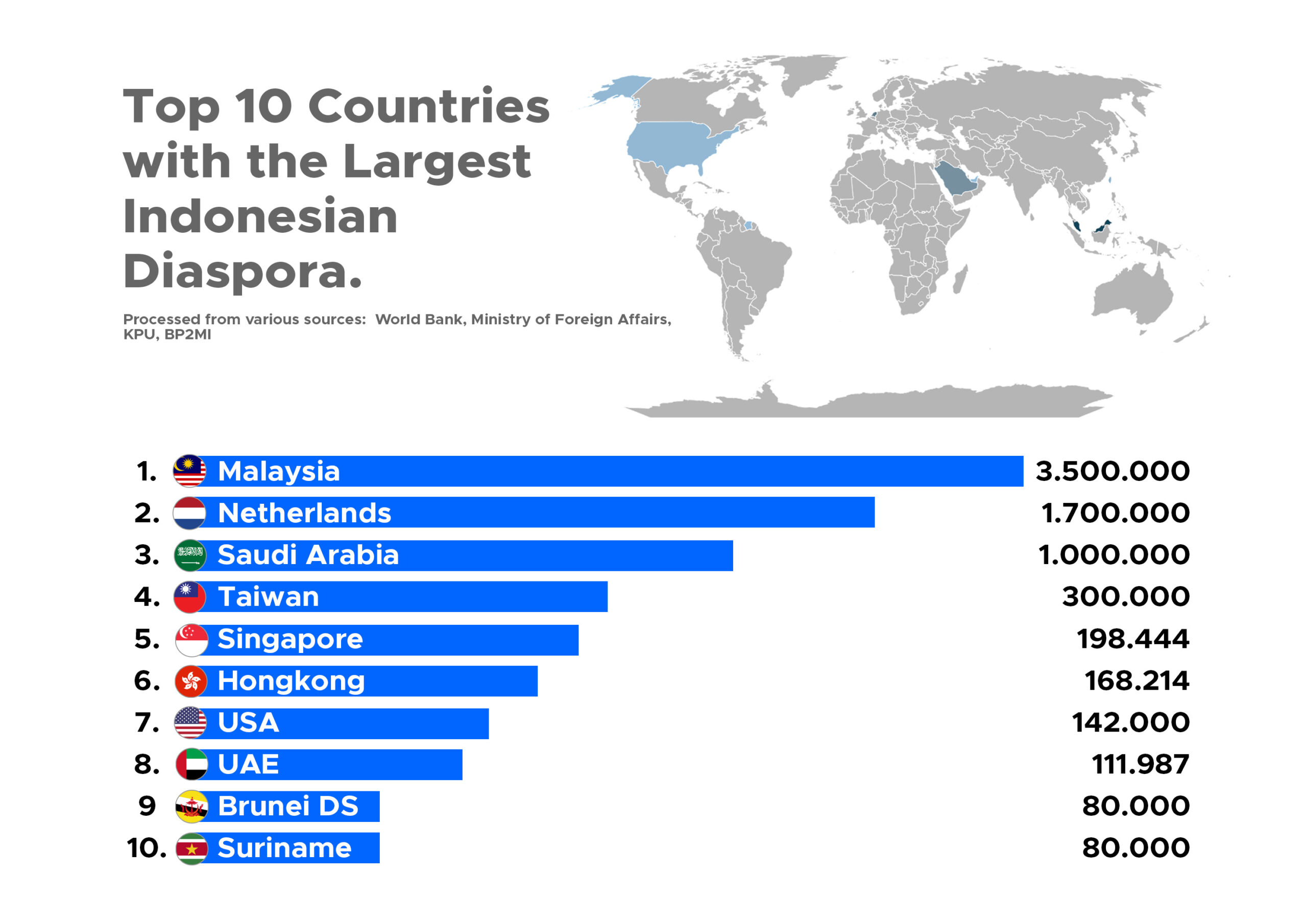
Source: World Bank; Ministry of Foreign Affairs; KPU; and BP2MI.
According to data from the Ministry of Foreign Affairs, BP2MI, and KPU, at least 3 to 4.6 million members of the Indonesian diaspora hold Indonesian citizenship. The rest hold foreign citizenship or limited dual citizenship until the age of 21 (Riyono, 2022; Ikhsanudin, 2023; KPU, n.d.).
Through remittances, the Indonesian diaspora helps drive the domestic economy. The amount of remittances sent is significant and has increased yearly. In 2023, for instance, total Indonesian diaspora remittances reached $14.22 billion, or 230 trillion rupiah (Kemenko Perekonomian, 2024). Notably, Indonesian diaspora remittances far exceed the 2024 Ministry of Defense budget of 140 trillion rupiah (Santika, 2024).
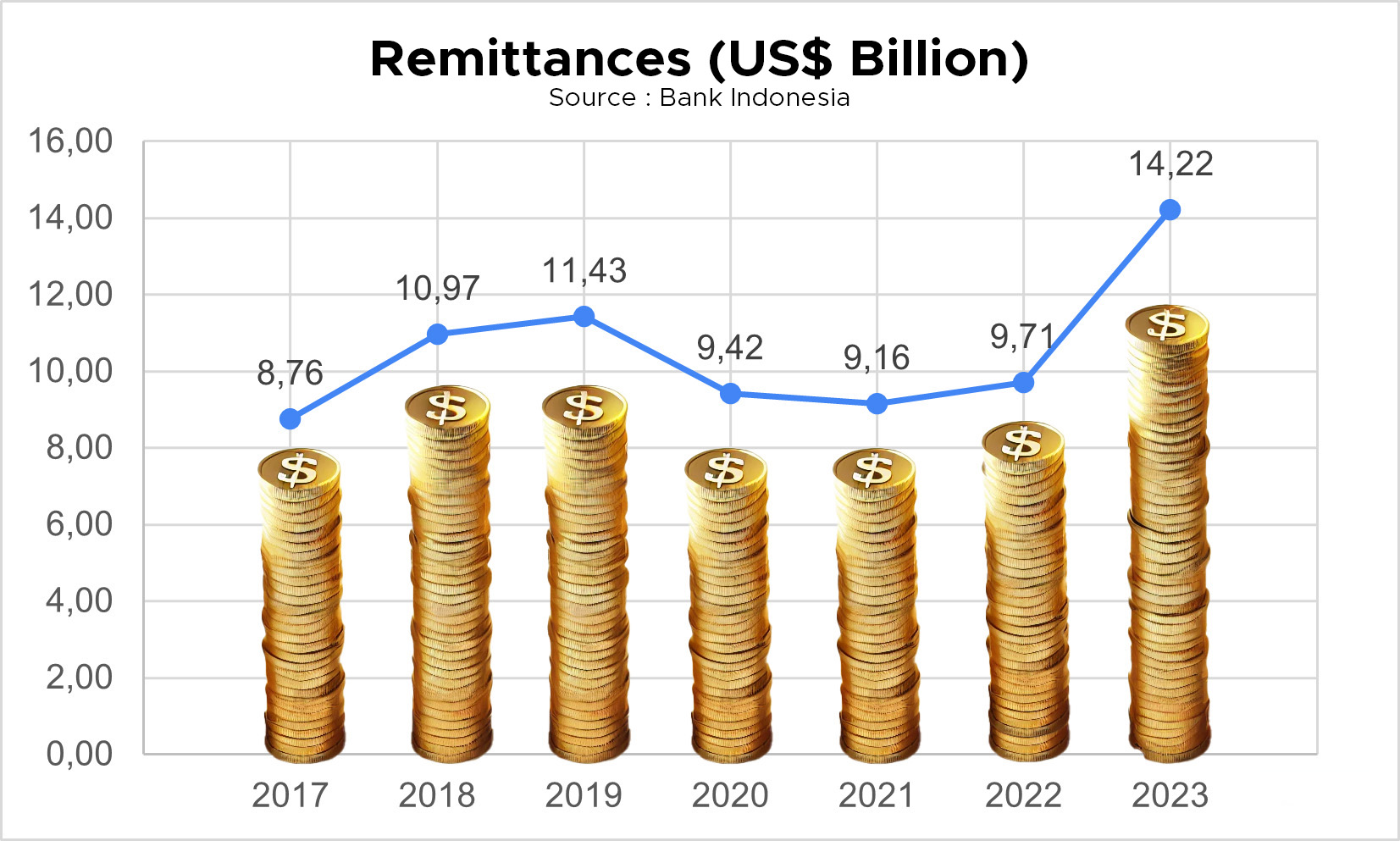
Like a microcosm of Indonesia, the Indonesian diaspora encompasses diverse professions. These include migrant workers, entrepreneurs, lecturers, scientists, professionals in science, technology, engineering, and mathematics (STEM), and athletes.
In their vision and mission, President and Vice President-elect Prabowo Subianto and Gibran Rakabuming Raka emphasize the importance of utilizing “the potential of the Indonesian diaspora in realizing national interests.” Better management of the Indonesian diaspora would undoubtedly bring more benefits to Indonesia. Furthermore, if managed by the state using strategic management principles and positioning the Indonesian diaspora as partners, the results could be far more extraordinary, measurable, and sustainable.
Definition of Strategy and Strategic Management
In the Kamus Besar Bahasa Indonesia (KBBI), there are several interpretations of the meaning of strategy. However, overall, strategy is categorized as a noun. One relevant definition provided by the KBBI for the discussion in this paper is that strategy is understood as a careful action or plan concerning activities to achieve specific goals.
In their book The Art of Strategy, Dixit and Nalebuff define strategy in the context of game theory and strategic decision-making. According to Dixit and Nalebuff, strategy essentially involves anticipating and overcoming resistance to plans or decisions (Dixit & Nalebuff, 2008). This definition highlights that an ideal strategy stems from decision-making while considering how others or the general public will respond to those decisions. Therefore, strategy in this context requires anticipatory planning and the ability to address potential challenges from others.
Meanwhile, Michael E. Porter offers another interpretation in his article, “What Is Strategy?” Porter explains that strategy is the creation of a unique and valuable position involving a different set of activities from competitors. Thus, the essence of strategy is to engage in activities or actions different from those of competitors (Porter, 1996).
However, simply choosing actions different from competitors is insufficient for success. This is because an idea, action, or method can eventually be imitated by competitors. Porter emphasizes that the focus is not just on the necessity to be different from competitors. Instead, the essence of strategy—which can be further elaborated—is the ability to ‘see’ the advantages and disadvantages in competition. Therefore, the core of strategy is choosing what should and should not be done.
The purpose of strategy is to respond to external changes relevant to an organization or institution while considering its internal capabilities. In other words, an organization or institution must also be able to exploit opportunities and minimize external threats to maximize the benefits of its strengths (Dian, 2022).
Another important point to consider is the relationship between strategy and thinking ability. Good strategy is related to good thinking ability. Strategic thinking will produce more creative and diverse solutions compared to ordinary thinking. The more creative the thinking, the greater the likelihood of success in managing future problems (Dian, 2022). A mature strategy will not emerge unless there is a genuine effort to plan for a problem.
Regarding the definition of strategic management, many experts have contributed their opinions. One of them is Hunger and Wheelen. As quoted by Soemantri in his book on strategic management, he explains that strategic management is a series of managerial decisions and actions that determine the long-term performance of a company. “This includes strategy formulation, strategy implementation, and evaluation” (Soemantri, 2019).
Another opinion is expressed by Fred R. David. As quoted by Dian, David explains that strategic management is the art and science of formulating, implementing, and evaluating cross-functional decisions that enable an organization to achieve its objectives (Dian, 2022).
Meanwhile, according to Paul Joyce, strategic management is defined as management actions oriented toward achieving long-term goals based on thorough analysis and assessment of the situation, options, and resources. It is often assumed, whether rightly or wrongly, that strategic management is a management innovation initially developed in the private sector and later adopted in the public sector (Thomas et al., 2017).
From the various explanations above, it can be understood that strategic management is both an art and a science used to formulate, implement, and even evaluate and improve decisions within a strategy to achieve the desired goals.
Strategic Management of Indonesian Diaspora Athletes at the Ministry of Youth and Sports
When the Minister of Youth and Sports of the Republic of Indonesia, Dito Ariotedjo, was inaugurated in April 2023, he believed that utilizing Indonesian diaspora athletes could boost the achievements of sports (Kemenpora, 2023). This belief was based on several reasons. First, the Indonesian diaspora is large enough to include individuals who have become quality athletes. Second, some Indonesian diaspora athletes are trained by systems and compete in countries with more advanced sports infrastructures. Therefore, their presence can help motivate, raise the level of competition, and share knowledge with athletes in Indonesia. The spirit is to combine and synergize the best talents from both within and outside the country. The ultimate goal is to enhance the achievements of sports by leveraging the talent of diaspora athletes. Third, utilizing diaspora athletes is not new in the sports world. For instance, in the World Cup, the utilization of diaspora athletes has been ongoing since the first FIFA World Cup in 1930.
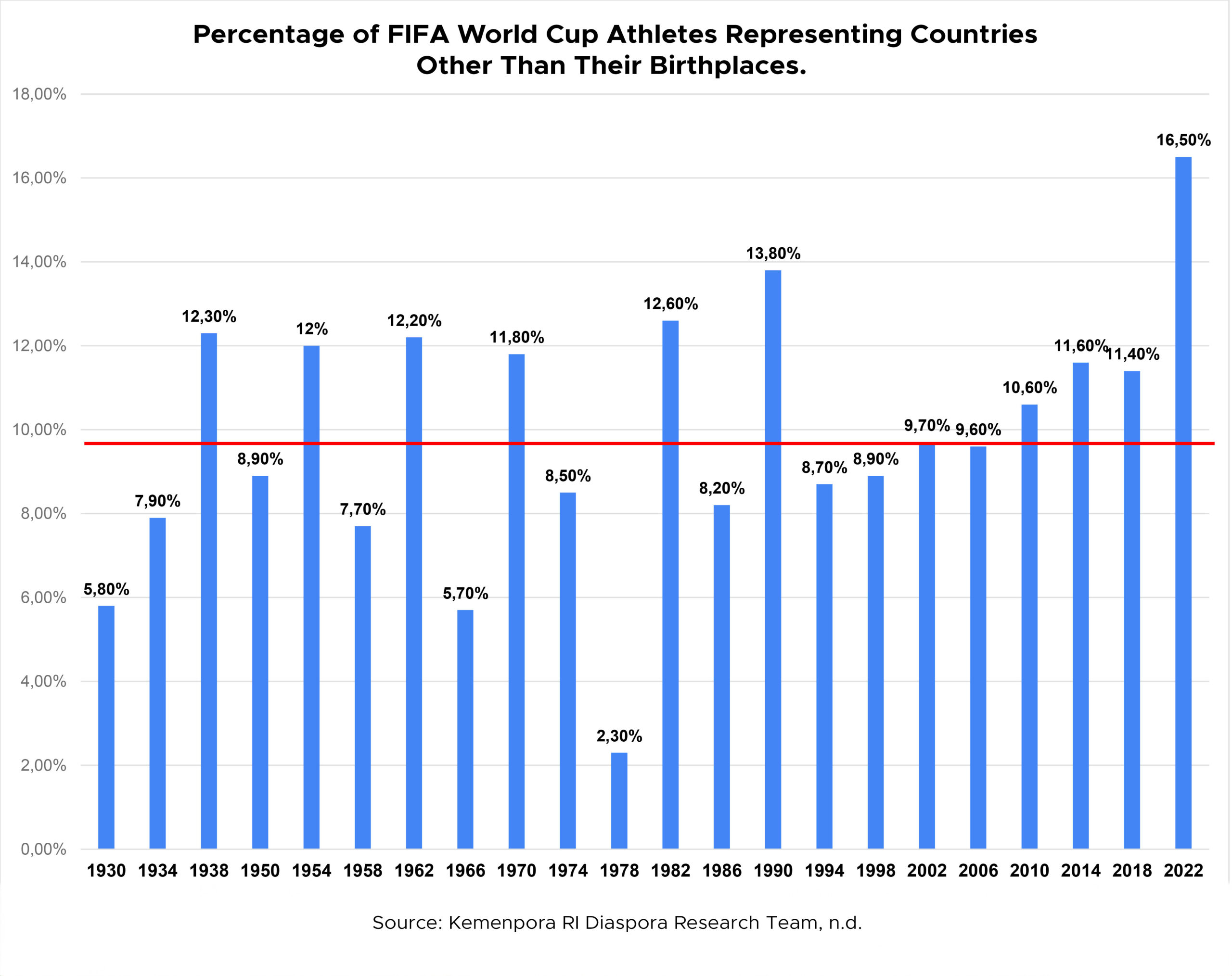
Source: Kemenpora RI Diaspora Research Team, n.d.
Led by the Minister’s Expert Staff on Diaspora and Youth Affairs, the strategic management concept for Indonesian diaspora athletes was developed. Referring to the basic concept of strategic management, four steps were implemented: analysis, formulation, implementation, and control and evaluation.
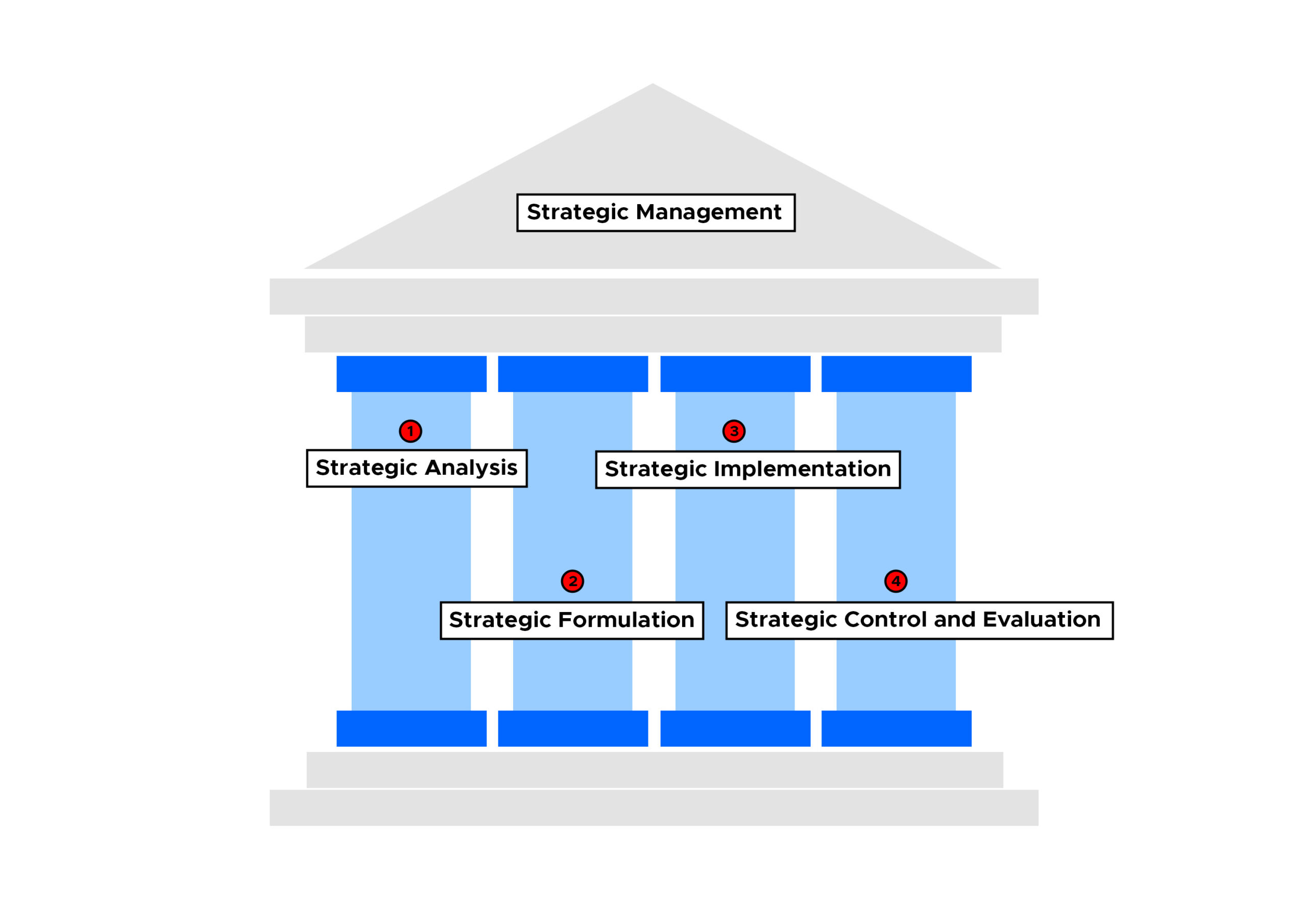
Source: Compiled by the author.
Strategic Analysis
From an environmental scanning perspective, it was found that the global distribution and quality of Indonesian diaspora athletes are highly varied. This conclusion was based on an evaluation of the sports environments and competitions where these diaspora athletes compete. It was also noted that there is currently no comprehensive database of diaspora athletes. Without complete and accurate data, the utilization of diaspora athletes would not be feasible.
From a stakeholder analysis perspective, it was found that Indonesian diaspora athletes are relatively open to sharing their data because of potential benefits, such as increased visibility to new potential fans. Sports representatives are also relatively open to the presence of a diaspora athlete database as it would help them identify the best athletes.
From an internal analysis perspective, the capabilities and resources required to create the first database of Indonesian diaspora athletes were mapped out.
From a SWOT analysis perspective, the following were identified: strengths (e.g., government legitimacy and public support), weaknesses (e.g., limited experienced human resources), opportunities (e.g., potential to obtain quality athletes that will help achieve significant milestones and create potential win-win situations with diaspora athletes), and threats (e.g., misconceptions about diaspora athletes being foreign athletes).
Strategic Formulation
From the vision-mission perspective, the vision is to create the first comprehensive and dynamic database of Indonesian diaspora athletes in Kemenpora’s history. The mission is to assist sports branches in utilizing the potential of diaspora athletes to find quality talent aligned with their needs. The ultimate goal is to enhance the performance of sports branches that leverage the talent of diaspora athletes.
From the prioritization perspective, it was decided to focus on athletes involved in individual sports with the potential to win medals or achieve significant success. Additionally, priority was given to identifying soccer players, as Indonesia will host the U-17 World Cup and participate in the Asian Cup at both senior and junior levels.
Strategic Implementation
From an operational planning perspective, mechanisms for data collection, deadlines, and verification for each diaspora athlete were established, with a target of identifying at least three athletes per week. From a resource allocation perspective, a low-cost method was chosen, utilizing open-source research, voluntary submissions, and online verification.
Strategic Control and Evaluation
From a performance measurement perspective, the quality of diaspora athletes identified and those eventually integrated and/or naturalized by sports branches were assessed. Quantitative metrics were prepared to measure the success of these athletes. From a continuous monitoring perspective, the performance of diaspora athletes was tracked, and it was evaluated whether their involvement in specific sports branches proved beneficial and led to notable achievements.
Real Results of Diaspora Athlete Involvement
Within a year, the Diaspora Athlete Research Team at Kemenpora identified over 600 diaspora athletes across more than 10 sports branches. The involvement of diaspora athletes has been positively assessed. For example, the participation of diaspora athletes in the U-17 World Cup and the success of the Indonesian national team in the Asian Cup, where Indonesia reached the round of 16 for the first time. Additionally, the contribution of diaspora athletes was evident in the U-23 Asian Cup, where Indonesia achieved fourth place as a debutant team.
Case Study: The Limited Success of the Indonesian Diaspora Card (KMILN)
The Ministry of Foreign Affairs of the Republic of Indonesia launched the Indonesian Diaspora Card (KMILN) in 2017 to document and map the potential of the diaspora abroad. Over six years, until 2023, only 1,300 diaspora members registered for the card. The low interest level of the Indonesian diaspora in KMILN can be easily explained through the lens of strategic management steps (Evandio, 2023).
First, from a strategic analysis perspective, this failure was due to a lack of deep understanding of the environment and diaspora needs. The lack of in-depth analysis of the demographics and preferences of the Indonesian diaspora resulted in KMILN being less aligned with their needs (“Kartu Diaspora”, 2020). The involvement of diaspora stakeholders in the research phase was also weak, leading to KMILN being seen as unbeneficial by many diaspora members.
Second, from a strategic formulation perspective, the vision and mission of KMILN did not seem to align with the reality on the ground. The goal of facilitating diaspora involvement in national development was not effectively reflected in the operational implementation.
Third, from a strategic implementation perspective, KMILN appeared inadequate. The card, which was just a piece of paper without an official symbol and contact number, showed a lack of attention to operational details. The slow and unstandardized issuance process was also not well received by the diaspora.
Conclusion
The Indonesian diaspora, numbering at least 9 million, can significantly contribute to national progress. The success of Kemenpora’s program in documenting and utilizing diaspora athletes provides tangible proof that this approach can be applied in a broader context, including in the STEM fields emphasized by the President and Vice President-elect.
As an initial step, the government may not need to form a new agency to manage the diaspora’s potential due to budget and efficiency considerations. An efficient solution could be establishing a Presidential Special Task Force for Diaspora Affairs or a Special Presidential Envoy on Diaspora. This unit or envoy would coordinate diaspora-related policies and programs, develop a comprehensive and dynamic diaspora database, design strategic programs, strengthen people-to-people diplomacy, and facilitate knowledge and technology transfer from the diaspora to Indonesia. Like Kemenpora, this unit or envoy is expected to diplomatically and agilely reach out to talented diaspora members and interact with stakeholders in Indonesia who need such talents. This concept resembles matchmaking and headhunting but is aimed at greater national interests.
By taking these steps, we can optimize the diaspora’s potential, not just in sports but also in other vital sectors that require specialized expertise. Therefore, the Indonesian diaspora can continue to be a valuable asset significantly contributing to national development, particularly in realizing the Vision of Indonesia Emas 2045.
*This writing is taken and translated from Manajemen Strategis Diaspora Indonesia: Optimasi Talenta untuk Kemajuan Indonesia.
References
ABC. (2020, September 8). Kartu Diaspora Indonesia Diluncurkan Tiga Tahun Lalu, Adakah Manfaatnya?. Tempo. Dikutip dari https://www.tempo.co/abc/5920/kartu-diaspora-indonesia-diluncurkan-tiga-tahun-lalu-adakah-manfaatnya
Akdon. (2009). Strategic Management. Bandung: Alphabeta.
Anonim. (2024, Mei 22). Which countries recognize a state of Palestine, and what is
changing?. CBS News. Dikutip dari Which countries recognize a state of Palestine, and what is changing? – CBS News
Dixit, A. K., & Nalebuff, B. J. (2008). The art of strategy: A game theorist’s guide to success
in business and life. United States: W.W. Norton & Company.
Etymology. (t.t.). Diaspora: Search online etymology dictionary. Dikutip dari
https://www.etymonline.com/v v?q=diaspora
Evandio, Akbar. (2023, Mei 25). Kemenlu Sebut Baru 1.300 Diaspora Pegang KMILN: Masih Sedikit Jumlahnya!. Kabar24. Dikutip dari https://kabar24.bisnis.com/read/20230525/15/1659187/kemenlu-sebut-baru-1300-diaspora-pegang-kmiln-masih-sedikit-jumlahnya
Fadhlurrahman, Irfan. (2023, Februari 15). Jumlah Penduduk di 38 Provinsi Indonesia Desember 2023. Katadata. Dikutip dari Jumlah Penduduk di 38 Provinsi Indonesia Desember 2023 (katadata.co.id)
Hamel, Prahalad. (1995). Strategic Management in Action. Jakarta: PT. Gramedia pustaka utama.
Hasan, Zein. (1980). Diplomasi Revolusi Indonesia Di Luar Negeri: (Perjoangan Pemuda/Mahasiswa Indonesia di Timur Tengah. Kementerian Luar Negeri. Dikutip dari Diplomasi Revolusi Indonesia Di Luar Negeri: (Perjoangan Pemuda/Mahasiswa Indonesia di Timur Tengah) | Kementerian Luar Negeri (kemlu.go.id)
Hatta, Muhammad. (2019). Patriot of a Patriot. Dikutip dari Portrait of a Patriot: Selected Writings – Mohammad Hatta – Google Books
Ikhsanudin, Arief. (2023, Mei 15). BP2MI Ungkap Beda Data dengan World Bank soal WNI Kerja di Luar Negeri. Dikutip dari https://news.detik.com/berita/d-6721611/bp2mi-ungkap-beda-data-dengan-world-bank-soal-wni-kerja-di-luar-negeri
Iwa Soemantri, Asep. (2019). Manajemen Strategik Diplomasi Maritim Berbasis Visi Maritim Global Dalam Rangka Mewujudkan Poros Maritim Dunia. Jakarta: Seminar Nasional Dies Natalis Seskoal.
IOM. (2024). World Migration Report. Dikutip dari Interactive World Migration Report 2024 (iom.int)
Joyce, Paul. (2021). Strategic Management and Public Governance in the public sector. London and New York: Routledge.
Kementerian Koordinator Bidang Perekonomian. (2024, Maret 27). Pemerintah Siapkan Regulasi Penguatan Tata Kelola Penempatan dan Pelindungan Pekerja Migran Indonesia. Dikutip dari https://www.ekon.go.id/publikasi/detail/5695/pemerintah-siapkan-regulasi-penguatan-tata-kelola-penempatan-dan-pelindungan-pekerja-migran-indonesia
Kementerian Pemuda dan Olahraga. (2023, April 3). Presiden Jokowi Lantik Dito Ariotedjo Sebagai Menpora RI. Dikutip dari https://www.kemenpora.go.id/detail/3336/presiden-jokowi-lantik-dito-ariotedjo-sebagai-menpora-ri
KPU.(t.t). Data Agregat WNI. Dikutip dari https://www.kpu.go.id/dmdocuments/Data_Agregat_WNI.pdf
Lindholm, Helena. (2021). Bridging identities through activism: Palestinians in Sweden Navigating the transnational divide. Taylor & Francis, 21, 293-312
Mearsheimer, John., & Walt, Stephen. (2006). The Israel Lobby And U. S. Foreign Policy. New York: Farrar, Starus, and Giroux.
Obama, B. (2020). A promised land. United States: Crown Publishing Group.
Porter, Michael E. (1996, November – Desember). What is Strategy: For starters, it’s not the same as operational effectiveness. Dikutip dari https://hbr.org/1996/11/what-is-strategy?utm_medium=paidsearch&utm_source=google&utm_campaign=domcontent_strategy&utm_term=Non-Brand&tpcc=domcontent_strategy&gad_source=1&gclid=Cj0KCQjwvb-zBhCmARIsAAfUI2sFTQxwVzlYp3p4MvFQ_KyQUL0B9A62JVetMXF3dcKaZKKSVosR0kAaAiySEALw_wcB
Klassen, Thomas, dkk. (2017). The Routledge Handbook of Global Public Policy and Administration. London and New York: Routledge.
Riyono, Tio, dkk. (2022). Budget Issue Brief: Politik dan Keamanan. Dikutip dari https://berkas.dpr.go.id/pa3kn/analisis-tematik-apbn/public-file/bib-public-136.pdf
Santika, Erlina F. (2024, Januari 4). Anggaran Kementerian Pertahanan 2024, Terbesar untuk Manajemen. Dikutip dari https://databoks.katadata.co.id/datapublish/2024/01/04/anggaran-kementerian-pertahanan-2024-terbesar-untuk-manajemen
Sudiantini, Dian. (2022) . Manajemen Strategi. Banyumas. CV. Pena Persada.
Suwandiyono. (2010) Manajemen Strategi dan Kebijakan Perusahaan. Alphabeta. Bandung.
World Bank. (t.t.). GDP. Dikutip dari GDP (current US$) | Data (worldbank.org)




